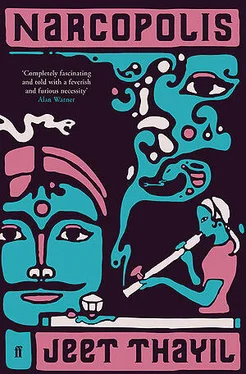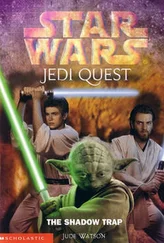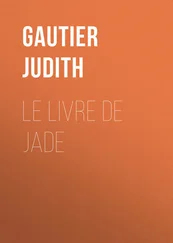Chapter Seven Business Practices among the Criminal Class: C & E
There was a Godrej padlock on the door. People came up the stairs and it was the first thing they saw. Then they saw the Customs and Excise notice tacked to the wall and understood that Rashid’s was shut indefinitely. They went elsewhere. That morning Rashid, Dimple and Bengali were in Gilass Palass, a teashop and falooda parlour near Grant Road Station. Only Bengali noticed the mirrors on the walls and ceiling, and, on smoked-glass shelving that ran the length of the premises, a collection of figurines in the likeness of swans and androgynous, possibly female angels. Rashid drank masala chai, and he held an unlit Triple Five in his hand.
‘It’s nothing,’ he said, ‘temporary, tell everybody we’ll be back very soon.’
‘How soon?’
‘Very soon.’
‘You already said that.’
‘Eat your khari biscuit.’
‘I told you something was wrong. The use.’
‘You didn’t.’
‘Noticing things, telling you. And then you forget. What’s the use?’
‘You didn’t tell me.’
‘Bilkul, I did, bhai, told you there was something wrong when that Customs and Excise came round asking for five lakhs instead of fifty thousand. He’s been taking money from you for years, same amount every time, like tax, and suddenly he adds a zero. Something was wrong.’
‘When did you tell me? You think I’d forget?’
‘Why not? You forget everything else.’
She was using the formal aap though her words were not formal at all. Bengali’s thoughts were in his face: look at this woman, until yesterday she was a prostitute in a hijra’s brothel and listen to her now, talking as if she’s Rashid’s equal. He was dismayed by her manner around his boss and by the way she said whatever came to her mind, whether respectful or not. She talks as if she is his wife and Rashid listens like a husband, he thought. But she’s more than a wife, more than both his wives put together: she’s his business partner and she’s better at it than he is. If she was in charge, we’d be rich and the competition would be mincemeat.
‘So that’s why you’re here, to remind me.’
‘And meanwhile.’
‘Meanwhile, we have a temporary shop and we keep going.’
‘Sounds like this meanwhile will be a long meanwhile. And you’ll do what?’
‘Something, I’m thinking.’
‘Bhai, the khana won’t reopen by itself.’
Rashid lit his cigarette and blew a ring and then he blew another through the first.
‘I know who’s behind it: the bhadwa. He came to see me, made an offer to buy my khana, such a low price I knew he was the one who put the C & E lock on the door.’
‘Khalid. He fixed it to put you out of business.’
‘Or take it over.’
They paid the bill and went to the new shop Rashid was renting in Arab Gully. It was in a side street off a side street. They’d settled in and set up a pipe (the place was so small there was room for only one) and Rashid was already comfortable, too comfortable, according to Dimple. She complained to Bengali that he had accepted the unacceptable. He was doing what he’d always done. He smoked the pipes she made. He drank his Black Label and chased garad. He got his meals delivered from Delhi Darbar. He didn’t seem worried by the loss of the khana, or by the fact that he’d been put out of business by a man like Khalid. Get it back, she told Rashid. Whatever it takes. Maro him if you have to, just get it back.
*
Bengali noticed that her hair had started to thin, and her body had lost its roundness. There were new lines around her mouth and her skin was darker. He wondered if this was why she’d taken to wearing a burkha. He wanted to tell her not to worry, that, dark or fair, she was a striking woman. Then, one night, on his way to get dinner for Rashid, he saw something that frightened him. He saw her standing under the street lamp outside Mr Lee’s, though the Chinaman’s khana was long gone by then. It was early, around eleven, but the street was dark and there were few pedestrians and he didn’t see Dimple until he was a few feet away. She was dressed all in black and in the darkness the only thing visible was her face. She stood frozen, her eyes turned up to the white light of the lamp, very still, except for her lips, which seemed to be moving, though he could not hear what she was saying. Her eyes were wide, as if she was begging for something, imploring someone implacable or merciless, someone who would never forgive or let her forget her errors. His first instinct was to apologize, for what he didn’t know. In the fluorescent light she seemed to be raw bone and skin wrapped in black fabric and she billowed like the sails of a ship. What kind of ship? An Arab ship, thought Bengali, a dhow, a ghost ship whose inhabitants rarely came on deck because they had to toil twice as hard as the living. Her skin had a bluish tint and her features were set in stone. She stared upwards without blinking and the thing he would remember later was the look in her eyes, there was no light in them, not even the reflected light of the street. He thought: This is a woman who understands death. She has tasted the meat of it and it pleases her. The thought frightened him and he walked past her without stopping.
*
Dimple fixed the Khalid problem herself, without meaning to or knowing she had. Salim found her in the room on Arab Gully, a space so tiny it could not be called a khana. It was a cupboard, smaller than the rooms at 007, and there was barely enough space to stretch out for a smoke. There was only one pipe, which Rashid was using. Salim had to wait with two other men, wait on the street with his O sickness building. Inside, he couldn’t speak freely to Dimple, because everything was overheard and there was only one topic of conversation that day. Salim listened without seeming to and he asked how they knew that it was Khalid who had shut down the khana. Was there a chance the customs people had done it for their own reasons? Rashid put his pipe down and took a deep breath, as if he was about to address a public gathering. Salim, I’m a businessman, it’s my skill. Yours is lifting wallets in such a way that a man will never know he has been robbed. Khalid has always wanted my business. I know this. I know it as surely as you know how much to charge for the Lala’s cocaine. Then Dimple said, Of course it’s Khalid. I’ve seen him with that bhadwa, the Customs and Excise, going bhai-bhai. He won’t be happy until he owns your business and he’ll charge twice the price and dilute the opium so it won’t do shit.
*
Later, they put together the details from sources on the street, reliable and not. Salim was seen arriving at Khalid’s with two friends, Kaanya the informer and Pasina the genius pocket-maar. They waited until Khalid was alone, then put him on the floor and tied his hands with twine. They force-fed him two pyalis of opium mixed with hot water. Khalid was not a smoker and the drink worked very quickly.
‘What we do, someone like you, we take a walk,’ Salim said.
‘Take a long walk, to Pydhonie or Dongri or even a make-it-fast walk to Grant Road Junction,’ said Kaanya.
‘We leave you on the pavement,’ said Pasina, laughing with his mouth open, his gums and lips bright red against the dark grain of his skin.
‘This is late at night, right, nobody around,’ Salim said.
‘Late at night, yes. We let you lie there for a while, look up, enjoy the stars, examine the cloud formations, see if it’s going to rain. Isn’t that right?’ said Pasina.
‘Bilkul. Cent per cent correct,’ said Kaanya.
‘Then, when you’re nice and comfortable, we pick up a stone, lots of them under the Grant Road Bridge, and put it on your head,’ Salim said.
Читать дальше












